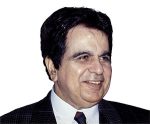Born on December 11, 1922, and passed away on July 7, 2021, Dilip Kumar (Mohammed Yusuf Khan).He was an actor from India who appeared in Hindi films. Known as Abhinay Samrat (Hindi for "Emperor of Acting") by the public, he dominated the Indian film industry from the late 1940s through the 1960s and is credited with inventing method acting in movies. Kumar was the first recipient of the Filmfare Award for Best Actor and retains the record for the most victories (eight, subsequently surpassed by Shah Rukh Khan). Another name for him is The First Khan of Hindi Cinema. With more than 80% of box office triumphs and other long-standing gross records, he has the most dominant box office record for a star (male or female) in Hindi film.
Early Life
Dilip Kumar was born as Mohammad Yusuf Khan[9] on December 11, 1922, in the Qissa Khawani Bazaar area of Peshawar, a city in the North-West Frontier Province of British India. He was raised by a Hindko-speaking Hindkowan Awan Muslim family. Lala Ghulam Sarwar Ali Khan (1890–1950) and his wife Ayesha Begum (1897–1948) had twelve children total. He was one of them. His dad was a fruit vendor. Khan received his education at the Barnes School in Deolali, which is now in Maharashtra. His father was an orchardist. He was born and raised in the same Peshawar area as his boyhood buddy and eventual film business colleague Raj Kapoor.
He relocated to Pune in 1940 and opened a canteen and dry fruit supply store. Khan's family is from Peshawar, but once India was divided into two states in 1947, they chose to stay in Bombay. Using the stage name Dilip Kumar, Khan made his acting debut in Jwar Bhata in 1944 and never again used his own name. Devika Rani, one of the producers of Jwar Bhata, suggested the name, according to Dilip Kumar's book, The Substance and the Shadow. He claimed in a 1970 interview that he took on this identity out of concern for his father, who disapproved of his acting profession due to the negative perception that films had at the time.
Career
Over the course of a fifty-year career, Kumar played a range of parts in less than sixty films. In the 1944 Bombay Talkies film Jwar Bhata, he made his acting debut. After several failed attempts, Jugnu (1947) became his first big office smash. The romantic drama Andaz (1949), the swashbuckling Aan (1952), the social drama Daag (1952), the romantic social Naya Daur (1957), the noir mystery Madhumati (1958), the social drama Paigham (1959), the action adventure Kohinoor (1960), the epic historical Mughal-E-Azam (1960), the crime drama Gunga Jumna (1961), and the comedy drama Ram Aur Shyam (1967) were among the films in which Kumar achieved further success.
Although Kumar's personal life received a lot of media attention, he had mostly shunned the spotlight and endorsements from the media. His long-term relationship with Madhubala, an actress and frequent co-star, came to an end during the Naya Daur legal case in 1957. He lived in the Mumbai district of Bandra till his death in 2021, after being married to the actress Saira Banu in 1966. The Government of India granted him the third-highest civilian honour in the nation, the Padma Bhushan in 1991, and the Padma Vibhushan in 2015, for his services to the film industry. In 1994, he was also given India's top honour in the film industry, the Dadasaheb Phalke Award.
Kumar is the only Indian to have been awarded the highest civilian medal in Pakistan, Nishan-e-Imtiaz, by the government of Pakistan in 1998. The Pakistani government designated Kumar's Peshawar childhood home as a national cultural site in 2014.
Private Life
While Tarana (1951) was being filmed, Kumar and Madhubala found themselves captivated to one another. They dated for seven years until Kumar's testimony against Madhubala and her father in the Naya Daur court case brought a stop to their union. Following Mughal-e-Azam, they never collaborated once more (1960). Later, in his autobiography, Kumar said, "Did I fall in love with Madhubala as the magazines and newspapers said at the time? To address this frequently asked question directly from the source, I have to say that I was drawn to her as a wonderful co-star and as someone who possessed some of the qualities I was hoping to discover in a woman at that particular age and point in time.She was really nimble, as I had already mentioned.
Actress Saira Banu, who was 22 years Kumar's junior, was his wife in 1966. In 1981, he took Asma Rahman, a socialite from Hyderabad, as a second wife. The union came to an end in January 1983. He resided in Bandra with Banu. There were no kids raised by them. Dilip Kumar disclosed in his book, Dilip Kumar: The Substance and the Shadow, that Banu became pregnant in 1972 but experienced pregnancy problems that resulted in miscarriage. They decided it was God's will and never tried to conceive after that.

